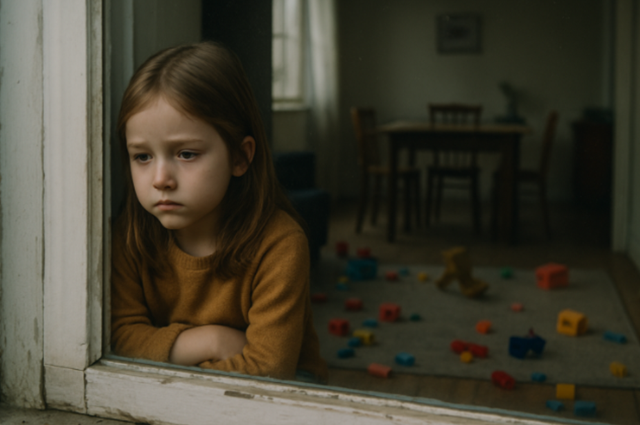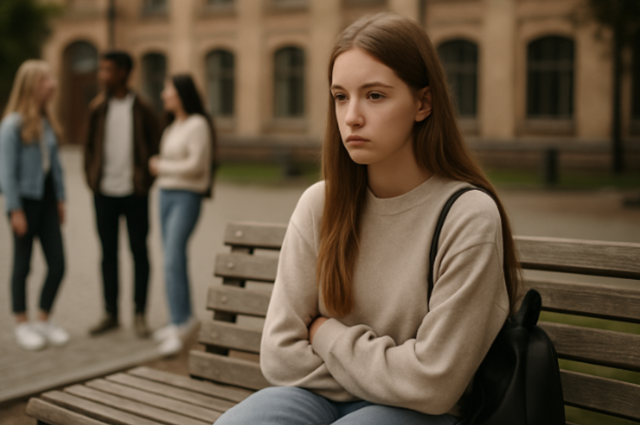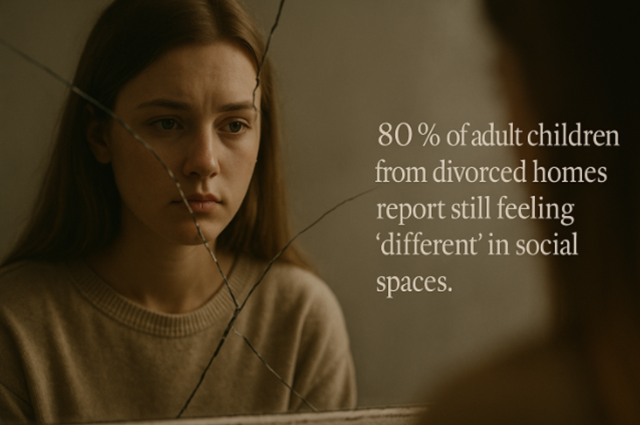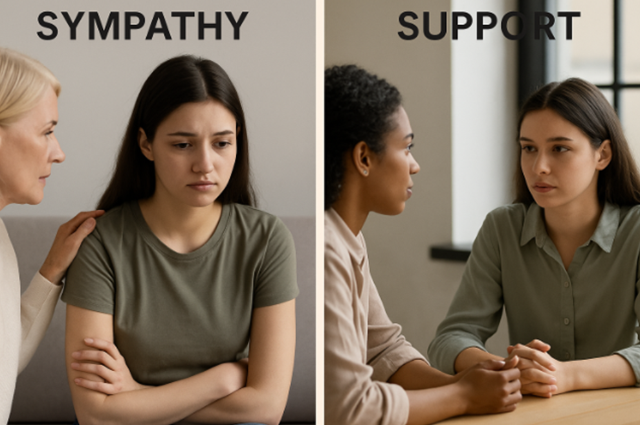
Abstract-
This article explores the emotional journey of a girl raised by a single mother after her parents' divorce. From childhood to adulthood, she is constantly met with pity, filtered praise, and quiet judgment, but a kind of soft othering that never lets her feel truly normal. The story highlights how children from broken homes are often seen through their past rather than for who they are, and how “being strong” becomes a label instead of support.
Childhood - Growing Up in a Broken Home
She was eight when the fights got too loud to ignore. Flying plates. Slamming doors. The silence was louder than the yelling. The kind of silence that filled her home with dread, her heart with fear, and unknowingly, her entire life.
The neighbors knew. Her teachers at school knew. Her friends and their families knew. Everyone did. The thin walls didn’t hold much back, and the yelling was too loud to be comforted or denied.
She remembers walking down the road and seeing Mrs. Shetty glance away quickly like she’d just been caught eavesdropping. Like she was looking at broken glass, not a child. It wasn’t hatred, but the eyes of pity, disgust, and sympathy burned more than anger ever could.
Her classmates were told to “be nice to her” by well-meaning teachers. Other kids’ parents treated her like some alien, someone from another world who didn’t quite belong to the society they lived in. She never got invited to sleepovers. Friends hesitated to visit her home. She became someone to observe, not include.
“She wasn’t seen like the other kids. She was seen as someone who came from something lesser.”
Even then, she could read between the lines of people’s reactions. Not quite shame—but something close. Something that sat heavy in her stomach every time someone hinted at her home life.
She started feeling like a shadow. Not because of a lack of love, but because everything about her was framed in lowercase. Quiet pity. Polite distance. That kind of soft disgust reserved for things too messy to talk about in front of “normal people.” She never felt normal. Never got to be a child.
"She became the poor girl with daddy issues"

* How Growing Up Without a Father Affects a Child Emotionally
Children who grow up without a father often carry invisible emotional weight. While every situation is different, many kids experience anxiety, low self-worth, or a constant need to prove themselves. These feelings don’t always come from direct trauma, but from how others treat them differently.
College - Even as an Adult, I’m Still “The Girl with a Story”
When her parents finally split up, she hoped the worst was over. No more late-night yelling. No more locked rooms. No more walking on eggshells after school. She believed that now, with the chaos behind her, she’d finally be allowed to live.
But the pity didn’t go away.
Relatives treated her like someone half-complete. Friends called her “too mature for her age.” And every compliment carried the weight of an unspoken asterisk- for someone from a broken home.
She heard it well, even when it wasn’t spoken.
“Every compliment had a shadow: 'You’re doing great... considering. You are so strong, you carried so well'”
They all tried to support her, she knew that. Their kindness wasn’t cruel. But their words always came as reminders of what she’d endured. They praised her strength, but they also reminded her where that strength came from—scars. Insecurities. A fractured desire for peace.
At a time meant for campus outings, messy friendships, and love, she was learning how to live with emotional baggage. While others were making memories, she was trying to survive the weight of her own.
🔍 Did You Know?🔍
A study from the American Psychological Association found that adults who experienced parental separation are 40% more likely to internalize subtle societal judgment during social interactions—especially in college and work environments.

And then there's the question- Harmless and causal
“Where’s your dad?”
It showed up in classrooms, hostels, canteen conversations, and even in moments of silence when family topics floated into the room. It was never just a question—it was a trigger. One that unlocked everything she worked hard to keep sealed.
When she said, “I don’t live with him,” the tone of the conversation would shift. People would pause. Some would fumble with their words. Some said nothing. And suddenly, she wasn’t just a student or a friend—she became “that girl” again.
She wanted to scream, “It’s okay, you can ask. You can talk to me like I’m normal.” But nobody ever did.
They tiptoed. They switched topics. They adjusted their expressions, softened their tone, and looked at her like she was glass. She wasn’t being seen for who she was. She was being seen through a lens, a cracked one.
She didn’t want applause for surviving. She didn’t want to be pitied. She just wanted to be a kid. A normal one.
But the world wouldn’t let her forget where she came from. No matter how much she tried to outgrow it, the label stayed:
“That poor girl. The one whose parents split up.”
* What Society Gets Wrong About Kids from Broken Homes
There’s a common stereotype that children from broken families are unstable or emotionally weak. In reality, many of these kids grow up to be highly responsible, independent, and emotionally aware. But the constant framing of their lives as “despite everything” puts unfair pressure on them. It reduces their identity to their backstory instead of who they are now.
Working - Strong, Capable, and Still Not One of Them
She wakes up early. She sleeps late. Not because she wants to, but because life has never allowed her to rest.
Every day, she shows up like a soldier in uniform—polished, prepared, present.
To everyone else, it looks like she’s made it. Her life now seems stable. She has a good job, a decent salary, and a rented flat in a decent part of the city.
She pays the bills. Stock the fridge. Makes sure her mother never feels the weight of a broken home again. From the outside, she appears to be rebuilding a life with dignity, but inside, she knows she’s still just surviving.
And yet, every room she walks into, she still feels like she doesn’t belong.
“She built everything from scratch—and still, they saw her as incomplete.”
People don’t say it out loud. But their eyes do. Every time people around her talk about their fathers, about their childhood homes with polished floors and photo walls, she stays quiet. It feels like she’s missing something. Or worse—like she is something missing.

Some people said, “I don’t know how you turned out so well, considering.”
Considering what?
That she didn’t have a father to pick her up from school?
That he wasn’t there to clap for her at graduation?
That he wasn’t there to protect her, to hold her through her heartbreaks, to make her laugh with terrible jokes, to give her the safety every daughter deserves?
🔍 Did You Know?🔍
Studies show that women raised by single mothers are often labeled as “overcompensating” or “emotionally guarded” in professional environments—despite outperforming peers in leadership and responsibility metrics. (Harvard Business Review, 2022)
Even in love, she never escaped it. Boys commented:
“If I married you, it would be out of respect. You’ve had it tough.”
Or worse: “You turned out alright for someone with no family background.”
Marrying her would be some kind of charity. An act of mercy.
And just like that, she wasn’t a woman. She was a statistic. An exception. A burden dressed up.
She was always made to feel like “the other girl.” The one with scars. The one who shouldn’t sit at the same table as those from full homes and photo-perfect dinners.
"The girl with no father"
* Challenges Faced by Children Raised by Single Mothers
Children raised by single mothers often face challenges beyond the home. From being judged in school environments to walking through social situations where traditional family structures are idealized, they’re constantly adjusting. Many grow up fast, taking on responsibilities early. But they’re also often unfairly labeled as “strong” instead of being supported emotionally like their peers.

Why Their Kindness Feels Like Judgment
It was never the big insults that cut the deepest.
It was the almost—disgusted glances, the compliments dipped in pity, the words coated in judgment. They came dressed in kindness but opened the healed wounds.
Why did her story have to come with a disclaimer?
Why did people applaud her strength as though it was surprising? As though a girl like her wasn’t supposed to be okay?
“She wanted to scream, “I’m just a person. A normal person.”
But she knew the rules. You don’t make people uncomfortable with your pain, especially when they’ve already decided you should be grateful for the bare minimum.
She learned how to smile politely while shrinking under the weight of it all. The weight of a broken home. A traumatic childhood. Healed emotional wounds.
💭 Sometimes, being “strong” feels like a punishment. Especially when the world doesn't see you as a Normal person
She could feel it in every room. In every look. In every phrase that began with “You’ve come so far,” and ended with silence.
She wasn’t just chasing her career, her life, her future.
She was chasing a world that never let her forget her past.

* Why “Being Strong” Can Feel Isolating for Children of Divorce
People often tell children of divorced parents that they’re “strong” or “mature for their age.” While meant as praise, these labels can feel isolating. Instead of being supported gently like their peers, they’re expected to carry emotional weight without complaint. Over time, this makes them feel like they’re not allowed to be vulnerable, tired, or even just… normal.
I Don’t Want to Be Strong, I Want to Be Normal
She’s done everything right.
She healed. She worked. She survived the kind of childhood that leaves people hollow. She took her pain and built something out of it. Something strong. Something whole. And yet, the world still treats her like she’s wearing a tag.
No father. Broken home. Strong girl. No family background.
She wants to rip it off. Not because she’s ashamed of where she came from, but because she’s so much more than that.
She’s funny. She’s loving. She’s obsessive over little things that make her feel safe- soft music, a good book, a quiet evening. She cries at sad movie endings. She hums when she’s anxious. She falls in love easily and trusts too little. She’s flawed, soft, resilient, and alive—all at once.
“She wasn’t asking to be praised. She was just asking to be seen, supported, and loved”
She is not her backstory. But still, that’s all anyone ever sees first.
💭 Identity isn't just what you've been through, it's who you are beyond survival. But when survival is your first introduction, people often stop there.
She’s tired.
Tired of being the exception.
Tired of being inspirational.
Tired of being introduced with a pause.
She wonders—Will I ever walk into a room and not be the girl with a story?
Will I ever just be... me?

* The Long-Term Impact of Growing Up in a Broken Family
The effects of growing up in a broken family don’t end in childhood. For many adults, the impact continues into relationships, self-image, and career choices. They may overperform to prove their worth or struggle with trust and connection. Society often overlooks these long-term effects, focusing only on the early disruption, not the emotional patterns it creates in adulthood.
This Isn’t a Sob Story, it is a request.
This isn’t a rant. It isn’t a rebellion. It’s a quiet plea.
I hope that someday, society learns the difference between sympathy and support. That people stop treating children of divorce like a footnote in some tragic film. That they stop handing out praise like bandages, and start seeing people without the context of their pasts.
She doesn’t want your pity. She doesn’t need to be reminded of where she came from—she lived it.
She just wants to be normal. She just wants to be enough.
“She just wants to walk into a room and not feel like she has to prove she belongs there.”
Because in the end, all she ever needed was to be allowed to just exist.
Not as an inspiration.
Not as a survivor.
Not as a symbol of pain wrapped in grace.
Just like herself.
Because sympathy is not support.
. . .
